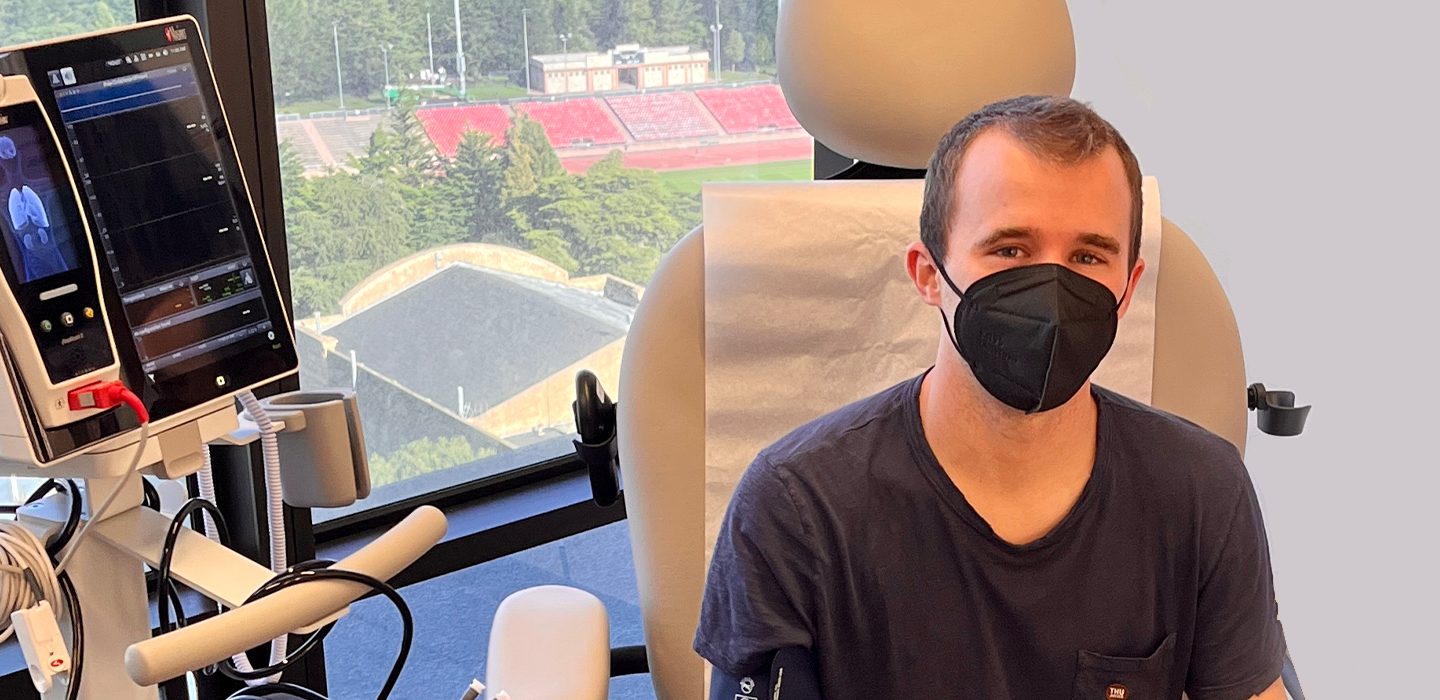Jeff: Putting the Pieces Together
One Family’s Struggle Meets One Doctor’s Vision

Jeff Grimes – an active, athletic kid – was diagnosed with hypertension, or high blood pressure, at age 16.
“I remember being confused,” Jeff says. “So many questions ran through my head. Why did this happen to me? What can I do about it? But there were no obvious answers.”
Jeff started medication but wanted other options. He did his own research, watched what he ate, and modified his exercise routine. The turning point came when, at age 22, Jeff met Elaine Ku, MD, a UCSF nephrologist with unique expertise in pediatric and adult hypertension.
In Dr. Ku, Jeff found a partner who was willing to do everything it took to optimize his health. Doctor and patient conducted “experiments” together, tinkering with everything from the finer details of Jeff’s plant-based diet to his medication cocktail and his home-based blood pressure monitoring tools. When Jeff’s readings improved, they recorded their approach and strategized about next steps.
“Dr. Ku is unlike any other doctor I have ever encountered,” Jeff says. “She devised a thorough plan that we could run together to manage my blood pressure – it was the scientific method mixed with her infectious energy to get to the bottom of things.”
A Growing Concern
An increasing number of young people in the US experience high blood pressure. As many as one in eight young adults has hypertension, and the rate is expected to rise over the next decade.
The consequences are significant. Decades of living with high blood pressure can weaken heart and brain function. And at a moment in life when passions, professions, and relationships begin to flourish, the side effects associated with blood pressure medication can diminish quality of life by decreasing energy levels, undermining mental health, and impairing cognitive function.
Yet little is known about the lifelong consequences when hypertension starts in young adulthood. With its relatively low fatality rate compared to hypertension in older adults and the long-term nature of studies needed for younger adults, funding for research remains elusive.
“Jeff had so many questions, but I had to tell him there was no trial data on his age group,” Dr. Ku says. “Everything we knew had only been tested in older adults – there is no research center, no meaningful funding applied to understanding hypertension in young adults. It was Jeff’s questions that got me thinking about what to do next.”
A Reason to Give
Michael and Janelle Grimes were shocked to learn that their physically fit, diet-conscious, teenage son had high blood pressure. Then they put the pieces together: Janelle learned that both her father and sister had been diagnosed with hypertension as young adults despite also leading active, healthy lives.
Literally no one in the world is studying this. So when we heard Dr. Ku's vision...we had to get involved.
Dr. Ku confirmed that hypertension is surprisingly common in healthy young people. However, without definitive data, all she could do for patients like Jeff was develop personalized treatment plans through careful trial and error – and hope for the best.
But there was another way, she told Michael and Janelle. With philanthropic support, she could design an innovative research study focused entirely on young adults with hypertension. The study would engage patients like Jeff directly in data collection using advanced health monitoring technology and study participants over an extended period to optimize results.
“Literally no one in the world is studying this,” Michael says. “So when we heard Dr. Ku’s vision – to create the most advanced research initiative in the world focused on hypertension – we had to get involved.”
A Pioneering Initiative
In 2021, the Grimes made a generous gift that will help Dr. Ku launch a groundbreaking hypertension research study focused solely on young adults – an innovative effort that will use digital tools to optimize treatment and support quality of life.
Their gift will cover the project’s pilot phase, which will involve collecting preliminary data on a few dozen participants over three years. That data will inform the design of a full research study that will follow 1,000 participants from across the country for eight years.
For Dr. Ku, the hard work has only just begun. In addition to launching the pilot phase in 2022, she will need to raise $9 million to fund the full project and fulfill her vision of establishing a world-renowned center for young adult hypertension. She considers this a wonderful challenge to have; the Grimes helped her take the crucial first step that will lay the groundwork for the project’s future.
“We realize we are only getting the implementation of Dr. Ku’s vision started,” Michael says. “She will need so much more support to see this project through to completion. We just hope others find her work as inspiring as we do and decide to join her.”
For information about how you can support the Young Adult Hypertension Research Initiative, email Jennifer Ratliff at [email protected].